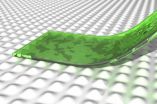(Press-News.org) Bowel cancer patients with high levels of vitamin D in their blood are more likely to survive the disease, a study shows.
Patients with the highest levels of vitamin D have half the risk of dying compared with those with the lowest levels, the findings reveal.
The study is the first to correlate total blood levels of vitamin D in bowel cancer patients after their diagnosis – which includes that produced after exposure to sunlight and that obtained from dietary sources – with their long term survival prospects.
The University of Edinburgh team tested blood samples from almost 1600 patients after surgery for bowel cancer.
The greatest benefit of vitamin D was seen in patients with stage 2 disease, at which the tumour may be quite large but the cancer has not yet spread.
Researchers found that three quarters of the patients with the highest vitamin D levels were still alive at the end of five years, compared with less than two thirds of those with the lowest levels.
The results show that vitamin D is associated with a much better chance of cancer survival, although the nature of this relationship is not clear from this study.
The study's authors aim to set up a clinical trial to test whether taking vitamin D tablets in combination with chemotherapy can improve bowel cancer survival rates.
Measuring vitamin D levels in bowel cancer patients could also provide a useful indication of prognosis, the scientists say.
Professor Malcolm Dunlop, of the Medical Research Council Human Genetics Unit at the University of Edinburgh, said: "Our findings are promising but it is important to note that this is an observational study. We need carefully designed randomised clinical trials before we can confirm whether taking vitamin D supplements offers any survival benefit for bowel cancer patients."
INFORMATION:
The research, funded by Cancer Research UK, is published in the Journal of Clinical Oncology.
Sunshine vitamin ups bowel cancer survival odds, study finds
2014-07-09
ELSE PRESS RELEASES FROM THIS DATE:
Short circuit in the food web
2014-07-09
Jena (Germany) They are amongst the most numerous inhabitants of the sea: tiny haptophytes of the type Emiliania huxleyi. Not visible to the naked eye, when they are in bloom in spring, they form square kilometer sized patches, they are even visible on satellite images. "Together with other phytoplankton, Emiliania huxleyi is responsible for approximately half of the global photosynthesis output," states Prof. Dr. Georg Pohnert of the Friedrich Schiller University Jena (Germany). In the process the greenhouse gas carbon dioxide – CO2 – is extracted from the atmosphere and ...
Fit for the frontline? New study identifies the hearing requirements of British soldiers
2014-07-09
AUDIO:
The gunshot is a binaural recording using KEMAR, the weapon was an SA80 assault rifle and the microphone is 50m downrange from the firer and approximately 30cm from the bullet...
Click here for more information.
University of Southampton researchers, with assistance from the Ministry of Defence, have conducted the first study to identify the hearing requirements of British soldiers fighting on the frontline.
The study, which provides an important and novel insight into ...
Even geckos can lose their grip
2014-07-09
Not even geckos and spiders can sit upside down forever. Nanophysics makes sure of that. Mechanics researchers at Linköping University have demonstrated this in an article just published in Physical Review E. Knowledge that can be of great industrial benefit.
Geckos and spiders that seem to be able to sit still forever, and walk around upside down have fascinated researchers worldwide for many years. We will soon be able to buy smart new fasteners that hold the same way as the gecko's foot. But the fact is, sooner or later the grip is lost, no matter how little force ...
Frogs have developed rapid defences against the red swamp crayfish
2014-07-09
The common frog is one of the amphibians with the highest distribution in the Iberian Peninsula. It reproduces preferably in permanent areas of water where it comes into contact with the red swamp crayfish, which preys on its larvae. Research carried out by the Spaniard Germán Orizaola from the University of Uppsala (Sweden) confirms that the larvae of these frogs have developed a defensive response to the invasive species. They also have deeper tails and larger bodies if they co-exist with the crayfish.
Numerous invasive organisms are currently spreading outside of their ...
RUB chemists develop novel catalyst with 2 functions
2014-07-09
Chemists at the Ruhr-Universität Bochum have made a decisive step towards more cost-efficient regenerative fuel cells and rechargeable metal-air batteries. They developed a new type of catalyst on the basis of carbon, which can facilitate two opposite reactions: electrolysis of water and combustion of hydrogen with oxygen. A catalyst of this kind might make the storage of wind and solar energy and the manufacture of cost-efficient batteries, for example for electric cars, possible. The team published their report in the "International Edition" of the magazine "Angewandte ...
Rotten egg gas holds key to healthcare therapies
2014-07-09
It may smell of flatulence and have a reputation for being highly toxic, but when used in the right tiny dosage, hydrogen sulfide is now being being found to offer potential health benefits in a range of issues, from diabetes to stroke, heart attacks and dementia. A new compound (AP39), designed and made at the University of Exeter, could hold the key to future therapies, by targeting delivery of very small amounts of the substance to the right (or key) places inside cells.
Scientists in Exeter have already found that the compound protects mitochondria – the "powerhouse" ...
NIH launches Phase I clinical trial of novel drug to treat Clostridium difficile infection
2014-07-09
The National Institute of Allergy and Infectious Diseases (NIAID), part of the National Institutes of Health, has launched an early-stage clinical trial of CRS3123, an investigational oral antibiotic intended to treat Clostridium difficile (C. difficile) infection. CRS3123 (previously known as REP3123) is a narrow-spectrum agent that inhibits C. difficile growth while sparing normal intestinal bacteria.
The Phase I trial will enroll up to 30 healthy men and women ages 18 to 45 in a dose-escalation study to evaluate the investigational drug's safety and tolerability. Quintiles, ...
The impact of big data on health care: Health Affairs' July issue
2014-07-09
Big data can yield big savings, if they are used in the right ways. David W. Bates of the Brigham and Women's Hospital and coauthors analyzed six use cases with strong opportunities for cost savings—high-cost patients; readmissions; triage; decompensation (when a patient's condition worsens); adverse events; and treatment optimization when a disease affects multiple organ systems. They suspect that cost-savings benefits will vary widely, though the current costs associated with all six scenarios will be significant. The authors suggest that using analytics for multiple ...
Discovery of new drug targets for memory impairment in Alzheimer's disease
2014-07-09
VIDEO:
This is a movie showing how the reactive astrocytes in the brains of Alzheimer's disease model produce the inhibitory transmitter GABA by the enzyme MAO-B and release GABA through the...
Click here for more information.
Alzheimer's disease, which is the most common cause of dementia, is fatal and currently, there is no cure. In Alzheimer's disease, brain cells are damaged and destroyed, leading to devastating memory loss. It is reported that 1 in 8 Americans aged 65 or over ...
Neuroprotective effects of low concentration of lithium
2014-07-09
Lithium, as a neuroprotective agent, benefits for neuronal survival. Recent cDNA array studies have demonstrated that mood stabilizer lithium exhibits neuroprotective effects through multiple targets. Dr. Riadh Nciri and his team, Purpan Medicine Faculty, Paul Sabatier University, France, exposed SH-SY5Y cells to 0.5 mmol/L lithium carbonate for 25-50 weeks and then detected the expression levels of some neurobiology related genes and post-translational modifications of stress proteins in SH-SY5Y cells. cDNA arrays showed that pyruvate kinase 2 (PKM2) and calmodulin 3 expression ...




